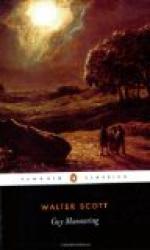GUY MANNERING
OR
THE ASTROLOGER
CHAPTER I
He could not deny that, looking round upon the dreary region, and seeing nothing but bleak fields and naked trees, hills obscured by fogs, and flats covered with inundations, he did for some time suffer melancholy to prevail upon him, and wished himself again safe at home.
—’Travels of Will. Marvel,’ Idler, No. 49.
It was in the beginning of the month of November 17—when a young English gentleman, who had just left the university of Oxford, made use of the liberty afforded him to visit some parts of the north of England; and curiosity extended his tour into the adjacent frontier of the sister country. He had visited, on the day that opens our history, some monastic ruins in the county of Dumfries, and spent much of the day in making drawings of them from different points, so that, on mounting his horse to resume his journey, the brief and gloomy twilight of the season had already commenced. His way lay through a wide tract of black moss, extending for miles on each side and before him. Little eminences arose like islands on its surface, bearing here and there patches of corn, which even at this season was green, and sometimes a hut or farm-house, shaded by a willow or two and surrounded by large elder-bushes. These insulated dwellings communicated with each other by winding passages through the moss, impassable by any but the natives themselves. The public road, however, was tolerably well made and safe, so that the prospect of being benighted brought with it no real danger. Still it is uncomfortable to travel alone and in the dark through an unknown country; and there are few ordinary occasions upon which Fancy frets herself so much as in a situation like that of Mannering.
As the light grew faint and more faint, and the morass appeared blacker and blacker, our traveller questioned more closely each chance passenger on his distance from the village of Kippletringan, where he proposed to quarter for the night. His queries were usually answered by a counter-challenge respecting the place from whence he came. While sufficient daylight remained to show the dress and appearance of a gentleman, these cross interrogatories were usually put in the form of a case supposed, as, ‘Ye’ll hae been at the auld abbey o’ Halycross, sir? there’s mony English gentlemen gang to see that.’—Or, ’Your honour will be come frae the house o’ Pouderloupat?’ But when the voice of the querist alone was distinguishable, the response usually was, ‘Where are ye coming frae at sic a time o’ night as the like o’ this?’—or, ‘Ye’ll no be o’ this country, freend?’ The answers, when obtained, were neither very reconcilable to each other nor accurate in the information which




